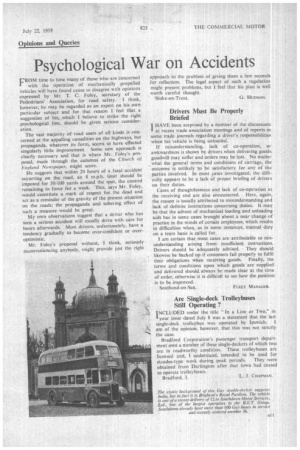Opinions and Queries
Page 45

If you've noticed an error in this article please click here to report it so we can fix it.
Psychological War on Accidents
FROM time to time many of those who'are concerned with the operation of mechanically propelled vehicles will have found cause to disagree with opinions expressed by Mr. T. C. Foley, secretary of the Pedestrians' Association, for road safety. I think, however, he may be regarded as an expert on his own particular subject and for that reason I feel that a suggestion of his, ,which I believe to strike the right psychological line, should be given serious consideration.
The vast majority of road users of all kinds is concerned at the appalling casualities on the highways, but propaganda, whatever its form, seems to have effected singularly little improvement. Some new approach is clearly necessary and that is where Mr. Foley's proposal, made through the columns of the Church of England Newspaper, might score.
He suggests that within 24 hours of a fatal accident occurring on the road, an 8 m.p.h. limit should be imposed for 50-100 yards around the spot, the control remaining in force for a week. This, says Mr. Foley, would constitute a mark of respect for, the dead and act as a reminder of the gravity of the present situation on the roads; the propaganda and sobering effect of such a measure would be great. My own observations suggest that a driver who has seen a serious accident will usually drive with care for hours afterwards. Most drivers, unfortunately, have a tendency gradually to become over-confident or overoptimistic. Mr. Foley's proposal without, I think, seriously inconveniencing anybody, might provide just the right approach to the problem of giving them a few seconds for reflection. The legal aspect of such a regulation might present problems, but I feel that his plan is well worth careful thought.
Stoke-on-Trent, G. HUDSON.
Drivers Must Be Properly Briefed
I HAVE been surprised by a number of the discussions A at recent trade association meetings and of reports in some trade journals regarding a driver's responsibilities when his vehicle is being unloaded.
If misunderstanding, lack of co-operation, or awkwardness is shown by drivers when delivering goods goodwill may suffer and orders may be lost. No matter what the general terms and conditions of carriage, the outcome is unlikely to be satisfaCtory for any of the parties involved. In most vases investigated, the difficulty appears to be a lack of proper briefing of drivers on their duties.
Cases of thoughtlessness and lack of co-operation at the receiving end are also encountered. Here, again, the reason is Usually attributed to misunderstanding and lack of definite instructions concerning duties. It may be that the advent of mechanical loading and unloading aids has in some cases brought about a near change of practice in the minds of certain employees, which results in difficulties when, as in some instances, manual duty on a team basis is called for.
I am certain that most cases are attributable to misunderstanding arising from insufficient instructions. Drivers should be adequately advised. They should likewise be backed up if customers fail properly to fulfil their obligations when receiving goods. Finally, the terms and conditions upon which goods are supplied and delivered should, always be made clear at the time of order, otherwise it is difficult to see how the position is to be improved.
Southend-on-Sea. FLEET MANAGER.
Are Single-deck Trolleybuses Still Operating ?
INCLUDED under the title "In a Line or Two," in your issue dated July 8 was a statement that the last single-deck trolleybus was operated by Ipswich.. I am of the opinion, however, that this was not strictly the case.
Bradford Corporation's passenger transport department own a number of these single-deckers of which two are in roadworthy condition. These trolleybuses arc licensed and, I understand, intended to be used for standee-type work during peak periods. They were obtained from Darlington after that town had ceased to operate trolleybuscs.
Bradford, 3. L. J. CHAPMAN.




































































































